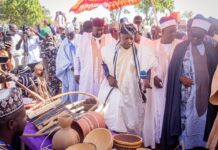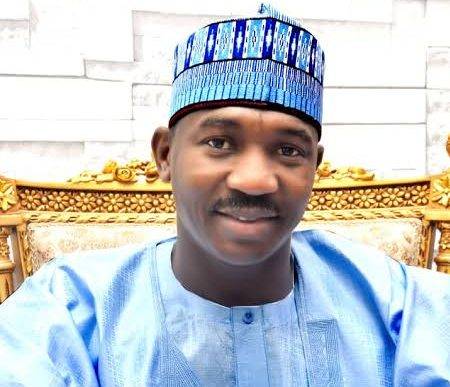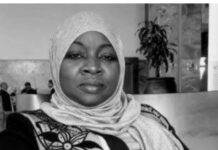zainabsule@yahoo.com, www.zainabokino.blogspot.com
To the extent that some citizens are now ready to march for what they call #RevolutionNow is a validation of the fear and anger expressed in different ways by some of our statesmen recently. Omoyele Sowore was arrested by the police last week for his plan to call out people to protest the many ills bedevilling us as a country. As incoherent as the articulation of his ideals may be, civic and civil engagement is part of the inalienable rights of Sowore or any Nigerian for that matter. And despite their lack of strategy and as unorganised as RevolutionNow group is, it resonated with the people such that they came out for the protest, while many supported through social media engagements. My good friend and former colleague at Daily Trust, Ibrahim Dan Halilu, was whisked away from his Kaduna home for simply calling for good governance and sound policy implementation, in a facebook post, supporting #RevolutionNow. Dan Halilu is a great guy; harmless, suave and civil, and whose only offence was his yearnings for the best for his country; he used this same access to campaign for the election of President Muhammadu Buhari in 2015.
The Islamic Brotherhood of Nigeria (IMN), otherwise known as Shiites was outlawed after their confrontation with the Police turned violent, leading to the death of 12 people including a corps member and a deputy commissioner of police whose death is still a subject of controversies. Few days later, the Sheikh was granted leave to seek medical help in India. Boko Haram opened fire on mourners killing scores in Maiduguri besides the incessant battles which have claimed the lives of our patriotic military men on the frontline.
By far, the greatest threat to the state today, after Boko Haram/ISWAP/ISIS menace are kidnapping and banditry. Five pastors of the Redeemed Christian Church were kidnapped last Thursday and released two days after the intervention of the Police, while some villages in Batsari LG in Katsina have been sacked due to the incessant activities of bandits. Zamfara’s story of kidnappings and killings has been in the public glare for long. The few incidents recounted above happened within a space of two weeks, and if they do not elicit reactions from men of conscience, the nation’s political leaders (ex-and serving), and statesmen, I wonder if these leaders will ever have the moral right to speak out again.
At a round-table conference organised by the General Abdulsalami Abubakar Institute for Peace and Conflict Resolution recently, speakers were unanimous on the urgent need to tackle challenges threatening the polity. The General himself did not mince words. He said tension was building up in the land and warned of dire consequences of inaction: “There is anger in the land and voices of reason are drowning very rapidly. It is clear that the situation requires that we all live up to the expectations of a nation that puts so much value on elders”.
Abdulsalami’s style may be subtle and polite, but it is not different from what the Alaafin of Oyo, OBJ, and others expressing their rage, in the street and on the social media, are saying. OBJ may be brash, rash and tempestuous, but while his approach differs, their message and target are the same—the government of President Buhari needs to up its ante and fulfil their campaign promises.
Shortly after the murder of Funke Olakunrin, Afenifere leader’s (Reuben Fasouranti) daughter, in Ore, the Yoruba political elite, the intelligentsia and elders of the region rose in unison to challenge the government on its security template that does not seem to be working. One of those voices of caution is Alaafin of Oyo’s who warned on the slippery slope towards ethnic self-help which can leave all of us bloodied. “The fact must be made clear that national unity is predicated on internal security. This brings into play the current debate on the desirability or otherwise of a single centre in the maintenance of security in a heterogenic country as largely diverse as Nigeria. Unless something is done urgently about power decentralisation, each ethnic group may be forced to self-help security structure which at the end may not be the best for the country”. The Alaafin was not done yet. In a letter to the president tagged: “Yoruba Question in the Nigerian Conundrum”, the Alaafin expressed worries about security situation, “especially in the South-West geo-political zone, nay the entire Yoruba land…, the incessant and increasing menace of Fulani herdsmen that have laid siege in almost all the highways of Yoruba land”. He talked about destruction of agricultural lands pointing to “imminent starvation” and went memory lane about the contribution of the Fulani jihad to the fall of Oyo Empire. “Without arrest, we cannot talk of their (herders) facing the law”, he added.
The Alaafin went sectional and short of criminalising the Hausa-Fulani ethnic group in the context of the ethnic politics we play. I do not agree with his ethnicisation of criminality, but I cannot begrudge his summation, especially as a traditional leader who represents and speaks on behalf of a part of the country, even as his reference to division in the country, desolation and destruction of farmlands are all of national concern.
Those who love to denigrate ex-President Olusegun Obasanjo and reduce his comments on national issues to the ranting of a defeated opposition voice, raised their fangs and voiced their angst last month, when in another round of habitual letter-writing, Obasanjo expressed his views on the state of the nation, and proffered solutions to President Muhammadu Buhari on the way forward. But instead of taking it in good faith, and leave the messenger out of the message (which is of national concern), government’s propaganda machine was unleashed on the ex-president. OBJ in the preamble to his letter to Buhari said “collective thinking and dialoguing is the best way of finding an appropriate and adequate solution to the problems”, which he enumerated to include threats to the nation’s cooperate existence linked to ethnic politics, security of lives and property, rising unemployment and infrastructural deficit, diminishing morale of troops fighting Boko Haram, herdsmen/farmers crises, banditry and kidnapping, poor management (or mismanagement) of our diversity, hate speech and smouldering agitations everywhere, instability in the polity and lack of consensus on what constitutes national unity. I doubt if anyone can say with certainty that these problems do not exist.
I also do not like many of OBJ’s ignoble roles of the past such as his sole hand-picking and subsequent voting to power of late Umaru Yar’adua and ex-President Goodluck Jonathan (perhaps to spite the North), but I cannot deny the fact of his statesmanship and patriotism. It is the least expected of a man who had the opportunity to serve twice as head of government, an elder and a technocrat.
Again, people have accused Obasanjo of talking too much when other former presidents have remained largely silent. But does being silent in the face of threat to collective nationhood, invariably make you a good leader? Besides, while Obasanjo always speaks out, he has never stopped any of his contemporaries from doing same. Ultimately, silence is not agreeability of happenings in the country and as managed by the government in power. Silence, especially in the face of tyranny, is not such a virtue to emulate anyway.
Statesmen and elders should not just be there to endorse and support politicians who seek their blessings in times of election. Their role is multi-faceted, and one of them is to proffer solutions and talk to the government of the day when the nation is sliding to anarchy. So even if you want to discountenance the Sowores, the Dan-Halilus and other citizens speaking out, you cannot wish the elders and statesmen away, when the state appears to be failing. They (statesmen, protesters, critics, ordinary citizens and even demonstrators) do not love Nigeria any less, or less patriotic than those who govern it. The job of fixing Nigeria is a collective one and everyone is fighting from his small corner of the world to see the Nigeria of their dreams. Therefore, we should be careful when we profile and label people just because their views do not reflect our mindsets.



